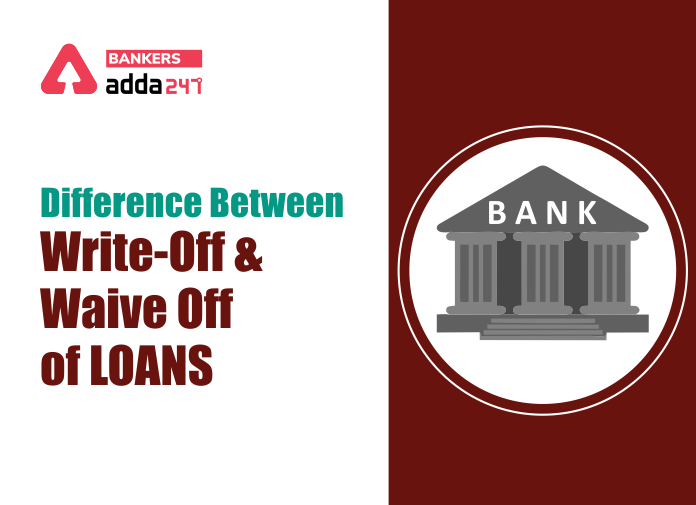Loan waiver and Loan write-off two different concepts of dealing with bad loans, but most of the people get confused with the actual definition of these terms. Recently, there was a heated debate going on amongst the ruling party and Congress, when the latter asked PM Modi to explain why the government has waived ₹68,607 crore worth of bank loans taken by the top 50 defaulters including Nirav Modi, Mehul Choksi and Vijay Mallya when country is amid COVID-19 crisis. In a response to an RTI, the Reserve Bank of India claimed that until September 2019, the government has written loans worth ₹6.66 lakh crore since 2014. The Finance Minister Nirmala Sitharaman strongly rebutted Congress stating that banks have written off the bad loans not given a complete waiver. But do you know about the difference between these two terms of banking awareness?
A lot of many people who are unaware of different financial terms and quotes get confused between loan waive offs and loan write-offs. Though the nature of both terms may seem to be almost similar, there is a major point that creates a difference between both. It is important to understand both the terms individually in order to understand the difference.
Waiver Loan and Write-Off Loan:
| Loan Waiver | Loan Write-Off | |
| Definition | Loan waive off is complete cancellation of recovery of loan. | A non-performing asset is considered in Loan write off after all avenues of recovery are exhausted and chances of recovery of due loan seem remote. Does not mean complete cancellation of recovery. |
| Done By | provided by govt. to farmers in scenario of natural clamity (conditions beyond control) | done by banks to achieve tax efficiency. |
Also Check,
- RBI Extends Fixed Rate Reverse Repo and MSF Window
- Combo Test Pack ( Bank | SSC | Insurance | Railway & Others) 12 Months Pack
- SBI Clerk Mains Prime 2020 Online Test Series
What is a Waive Off Loan?
There are a number of times when a particular person is not being able to repay back the loan amount taken. Most commonly, this happens when the person is under a financial crisis situation. It has been noted a number of times when farmers have taken loans for their cultivation and somehow due to bad crop or weather conditions, they are not able to earn well and hence are not able to repay back the loan too. In such a situation, many times, the Government may waive off the loans. Of course, this is done after a proper investigation in order to be sure that actually, the farmer was not able to make an earning and hence needs support. Also, there are certain terms and conditions under which waive offs can be done.
These days, waiving off the loans of the farmers has become a strong point politically. Many of the ministers try this method of working with the banks to waive off the loans of the farmers in order to fill in the vote banks. Whatever is the scene, this surely offers great help to the farmers.
Not just farmers, there are many more other people who can apply for a loan waiver if they have a justifiable reason for it. The officials conduct an investigation to check out the situation and then only they can decide whether the loans have to be waived off or not.
What is a Write-Off Loan?
Coming to the term Write-Off loans, one major point that differentiates it from waive-off is that the loan amount is not cleared out or waived off. For example, a person has taken a loan from a bank for a foreign trip and has not returned the loan amount to the bank after the promised time duration. In this case, the bank will try different methods to recover the loan amount such as calling the person, his family members, and even some legal steps. If even still the loan amount is not recovered, the bank will expect to recover the money whenever the person is back in the country again.
But this unrecovered loan amount cannot be left out without any records. Hence, in order to tally the amounts in the balance sheet, this amount is mentioned as a write-off loan amount so that this amount can be recovered later on. There are some recent incidents in India where a few of the industrialist figures have left the country with a huge loan amount and have not returned them yet. These amounts are recorded in the bank balance sheet as loan write-off as legal proceedings are under progress in order to recover the loan amount from them.
Hence, the major difference is that loan waive-off is something where the loan-taker is released from the burden of paying back the loan amount, while in the case of loan write-off; the financial institute still has hopes to get back the loan amount from the person who has taken loan but has not returned it back. The decision of waiving off is taken by the Government under certain conditions while loan write-off is done by the banks to keep a record of the unrecovered loan amount in their balance sheets.
Click Here to Register for Bank Exams 2020 Preparation Material
Practice With,
FAQ: Difference between Write-off and Waive Off Loans
Q. What does loan waiver mean?
Ans. A loan waiver is the relinquishment of the person’s ability to pay back loan due to certain circumstances. Like the government waives off loans taken by farmers in situations of natural clamity or very bad harvest.
Q. What is difference between write off and waive off?
Ans. Writing off a loan or asset is considering that it does not have future value or no longer serves the purpose whereas loan waiver is cancellation of recovery or refraining from claiming the dues.
Q. Do banks write off loans?
Ans. Yes, if required loan write-off is a tool used by banks to clean up their balance-sheets.
Q. Why banks may write off loans?
Ans. When a nonperforming loan is written off, the lender receives a tax deduction from the loan value.
Q. Why loans are written off?
Ans. Loan write off is used by banks in situations of bad loans or NPA.
Q. Can personal loan be waived off?
Ans. It is done in extreme situations like the earning member dies or became disabled to an extent that there is no source to pay back the loan.



 Daily Current Affairs 2nd July 2025, Imp...
Daily Current Affairs 2nd July 2025, Imp...
 The Hindu Review June 2025, Download Mon...
The Hindu Review June 2025, Download Mon...
 Daily Current Affairs 1st July 2025, Imp...
Daily Current Affairs 1st July 2025, Imp...


